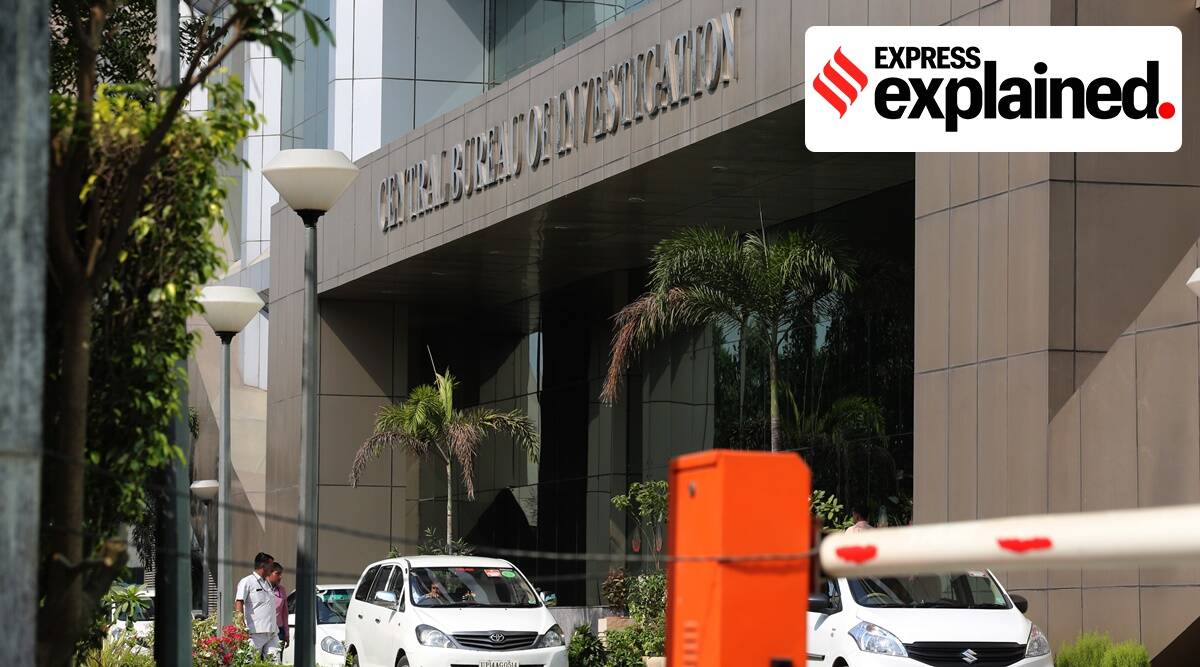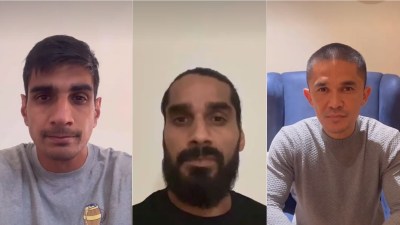Opposition leaders in CBI net: History of the struggle to secure agency’s independence
The SC has called the CBI a caged parrot, and CJIs have expressed doubts over its credibility and said it is no longer trusted. Attempts to secure its independence have been opposed or overturned by successive governments
 The Central Bureau of Investigation headquarters in New Delhi. (Express Photo: Tashi Tobgyal, File)
The Central Bureau of Investigation headquarters in New Delhi. (Express Photo: Tashi Tobgyal, File)In May 2013, as multiple corruption scandals dogged the UPA government, the Supreme Court made an observation about the Central Bureau of Investigation (CBI) that has stuck to the agency ever since. A Bench headed by Justice R M Lodha described the CBI as “a caged parrot speaking in its master’s voice”.
The observation was made in the context of government interference in the functioning of the CBI in its investigation of the coal blocks allocation cases. The apex court has since criticised the CBI for its “actions and inactions” on several occasions, and flagged fundamental problems with the functioning of the agency.
Doubts over credibility
Delivering the D P Kohli Memorial Lecture at the CBI on April 1 this year, then Chief Justice of India (CJI) N V Ramana lamented that the agency had gone from being the people’s most trusted to the subject of deep public scrutiny.
“When it comes to the CBI, it possessed immense trust of the public in its initial phase. …But with the passage of time, like every other institution of repute, the CBI has also come under deep public scrutiny. Its actions and inactions have raised questions regarding its credibility in some cases,” Justice Ramana had said.
Earlier in 2019, then CJI Ranjan Gogoi had questioned the role of the CBI in “politically sensitive” cases, and said that it reflected “a deep mismatch between institutional aspirations” and “governing politics”. Justice Gogoi was nominated to Rajya Sabha soon after he demitted office as CJI.
Struggle to fix processes
The struggle to free elite law-enforcement agencies such as the CBI and Enforcement Directorate (ED) from the stranglehold of governments and political parties has been ongoing since the 1990s. The landmark 1997 Vineet Narain judgment of the Supreme Court (Vineet Narain & Others vs Union Of India & Anr) dealt with this issue in detail.
The Supreme Court fixed the tenure of the CBI Director at two years, gave statutory status to the Central Vigilance Commission (CVC), and stipulated that a panel headed by the CVC and including top secretaries to the Union government would draw up a panel from which the Director of the ED would be selected.
The Lokpal Act, 2013, laid down that the CBI Director should be chosen, unanimously or by majority vote, by a search committee headed by the Prime Minister and also comprising the Leader of Opposition and the CJI or his representative, from a list of candidates drawn up by the Home Ministry and examined by the Department of Personnel and Training.
Despite these changes, very little has changed, said journalist Vineet Narain, who has long campaigned for the independence of the two agencies.
“The SC judgment and the CVC Act (of 2003) have been progressively diluted by various governments over the years. The advent of Lokpal diluted it even more. The current situation is that central agencies such as CVC, CBI, and ED have become completely defunct. Apart from following instructions from the government, they are doing nothing. And it is happening blatantly. The entire struggle for independence of CBI and ED is being defeated,” Narain told The Indian Express.
Structurally constrained
The CBI has been stymied both by the legal structure within which it functions, and by the changes made by governments in the Rules governing it. Over the years, these have progressively made the agency subservient to the Union government.
To prosecute any MLA, state minister, or MP, the CBI needs sanction from the Speaker of the state Assembly (in case of MLAs) or the Governor (for state ministers). In the case of an MP, sanction is sought from the Speaker of Lok Sabha or Vice Chairman of Rajya Sabha. Since all these sanctioning authorities have links to the ruling dispensation, Opposition parties feel they are unfairly targeted.
- In the Narada Sting Operation case, the CBI chargesheeted Firhad Hakim, Subrata Mukherjee, Madan Mitra, and Sovan Chatterjee — all ministers in the TMC-led West Bengal government at the time of the offence — after getting sanction from the Governor. However, other MLAs and MPs have not been chargesheeted, including TMC-turned-BJP leader Suvendu Adhikari, for lack of sanction from the West Bengal Assembly Speaker and Lok Sabha Speaker. Adhikari was an MP when the sting operation was conducted.
- In 2012, CBI sought sanction to prosecute former Maharashtra Chief Minister Ashok Chavan in the Adarsh Cooperative Housing case, which was denied in 2013 by then Governor K Sankarnarayanan. In February 2016, after the Narendra Modi government came to power and a new Governor, C Vidyasagar Rao, was appointed, the sanction came through.
- The Rajiv Gandhi government, through what is known as the “single directive”, introduced a provision in The Delhi Special Police Establishment (DSPE) Act, 1946, (from which the CBI derives its powers) which barred CBI from investigating officials of joint secretary level and above without permission from the government.
This was struck down by Vineet Narain, but was reintroduced by the Atal Bihari Vajpayee government. After it was struck down again by the Supreme Court in 2014, the Modi government introduced Section 17A into the Prevention of Corruption Act through an amendment. This amendment went far ahead of reintroducing the “single directive”, and barred the CBI from probing any public servant without the consent of the concerned government.
“It’s very clear that the agency has no freedom to probe anyone on its own. It is the government, at the Union or in states, or the court, which will decide who will be investigated,” a CBI official said.
Political tug-of-war
The work of the agency has been further constrained by the increasingly hostile relations between the Centre and the state governments. As many as nine states have withdrawn general consent to the CBI. Most of these are Opposition-ruled states, which have alleged that the CBI is being used by the Centre to target the Opposition. In March this year, Meghalaya, where the BJP is in a coalition government, withdrew general consent.
Since CBI needs consent of a state to probe offences in the state’s jurisdiction, a general consent is given to the agency so that consent is not required for every individual case. Withdrawal of consent means CBI cannot investigate even a central government employee stationed in a state without the consent of the state government.
However, this is not unique to the NDA regime. Throughout the history of the agency, several states — including Sikkim, Nagaland, Chhattisgarh, and Karnataka — have withdrawn general consent. In 1998, the Janata Dal led government led by J H Patel in Karnataka withdrew general consent, a decision that was not revoked by SM Krishna’s Congress government that came to power the following year.
Dangling job carrots
Critics have also pointed to the way in which successive governments have used the lure of post-retirement jobs to make CBI Directors toe their line. Former CBI Director Ashwini Kumar was appointed Governor of Nagaland by the UPA in 2013. Other former CBI chiefs got post-retirement jobs as members of the National Human Rights Commission under the UPA.
The NDA government last year amended the DSPE Act to give the CBI Director a tenure of five years, but added a caveat that after completion of the SC-mandated two-year tenure, the Director would get an extension of tenure each year at the pleasure of the government. Many saw this as dangling a carrot before the Director.
Narain says it is now for the judiciary to step in. “The judiciary has to decide what it wants to do with the hopes of 135 crore Indians for transparency and probity in public life. The court must ensure that the Vineet Narain judgment is implemented in letter and spirit. All the dilutions that have been brought in should be rectified. Any government which dangles carrots before judges in terms of post-retirement appointments is damaging the institution. SC judges also must refuse such offers in the interest of the integrity of the institution,” he said.
- 01
- 02
- 03
- 04
- 05






































